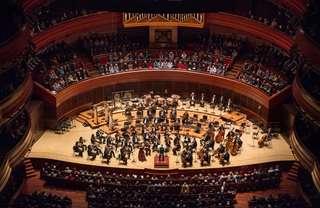|
Back
Măcelaru’s triumphant 5th Philadelphia
Verizon Hall
05/11/2017 - & May 12, 13, 2017
Anatol Liadov: Kikimora, Op. 63
Erich Wolfgang Korngold: Violin Concerto in D major, Op. 35
Pyotr Ilyich Tchaikovsky: Symphony No. 5 in E minor, Op. 64
Renaud Capuçon (violin)
The Philadelphia Orchestra, Cristian Măcelaru (conductor)

(© Jessica Griffin)
In May, Bolshoi Theater musical director Tugan Sokhiev had to bow out of his scheduled appearances guest conducting for the Philadelphia Orchestra because of a back injury. His doctors didn’t even want him to fly, let alone wave his baton. The orchestra’s conductor-in-residence Cristian Măcelaru stepped in on short notice and didn’t miss a beat.
The concert opener was Russian composer Anatol Liadov’s rarely performed Kikimora composed in 1909, meant as a ballet score for Serge Diaghilev’s Ballets Russes, but the collaboration was scrubbed because Liadov was taking too long to finish it. Based on a symphonic folk tale about a bewitched cat, it has predictable storybook narrative symphonics, with hints of modernism, in its use of percussion and its string effects. Măcelaru essayed a precision, showpiece performance.
Next, Erich Wolfgang Korngold’s Violin Concerto is a driving work of contrasting styles, and French violinist Renaud Capuçon is a great interpreter. His interlocks entrances in all three movements so fluid and instantly captivating. Korngold was one of the most celebrated composers of film scores in the golden age of Hollywood starting with 1935’s classic film version of A Midsummer’s Night Dream and other Hollywood hits including The Adventures of Robin Hood and Captain Blood. Despite detractors in classical music world, Korngold’s Violin Concerto was made instantly famous by Jascha Heifetz who premiered it in 1947 with the St. Louis Symphony.
Korngold’s central violin theme is serene and overtly romantic, that give way to Korngold’s driving tempos and the quick mood shifts of the piece that demand immediacy and technical artistry. Its theatricality shifts to near dissonant passages that Capuçon soften and he masterfully handles the fiery finish. In this performance though, most of the second movement was erratic paced, Capuçon seemed to be in his own zone, and the orchestra had an airless quality. But, everyone was back on track for the third movement and RC again superb on the demands of this piece. Often closing his eyes and swaying during the orchestral sections and seeming entranced as he arcs his body back as he finishes some of the solo lines.
The concert stealer actually was the orchestra’s moving performance of Tchaikovsky’s Fifth Symphony. Măcelaru’s sustaining thrilling tempos without sacrificing dimension or detail while those famous Philadelphia strings re-calibrating the acoustics in Verizon Hall. Măcelaru modulating Tchaikovsky’s central symphonic theme with contours that never lumber, or are played like a forced funeral march, as so often happen.
The detailing on the quieter passages as important as the sonic power and thrust of the fortissimos and crescendi, highlighting the continually impressive beefed up brass section that really seemed to up their presence all season. Principal bassoonist Daniel Matsukawa’s low tone accents luring you deeper into the inner symphonic drive of the piece. Jennifer Montone’s French horn in the second movement with expected flawless tone, she owns this passage and imbues it with something that reaches transcendence. This was all round a towering performance and doubly impressive with Măcelaru pinch hitting on the podium. At the end he gamely announced that he would be back for one of the orchestra’s ‘postlude’ recitals with organ soloist Peter Richard Conte performing Bach, Debussy and Franck.
Lewis Whittington
|